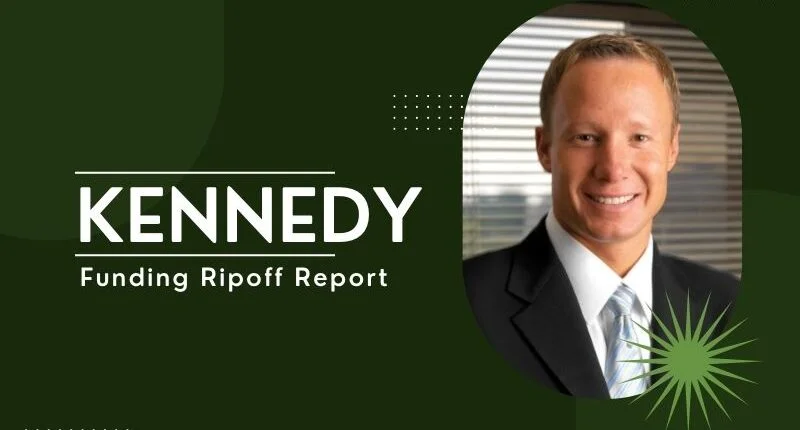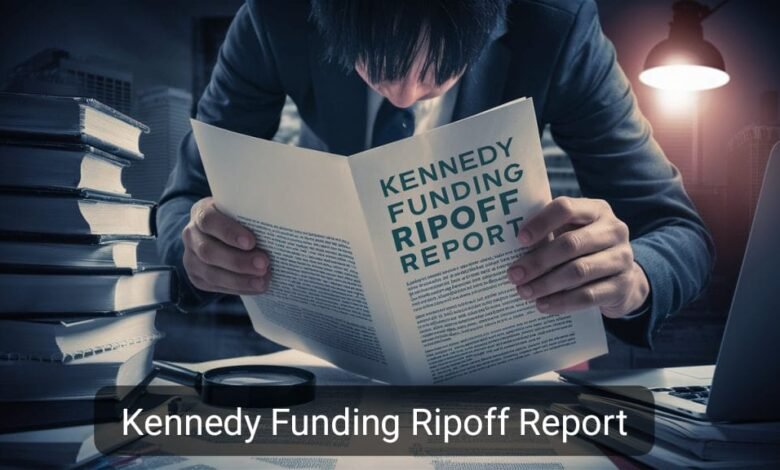Introduction
Kennedy Funding Ripoff Report, Navigating the world of real estate financing can be challenging, especially when traditional banks aren’t an option. This is where companies like Kennedy Funding step in, offering alternative lending solutions for those in need of quick, flexible financing. However, Kennedy Funding has also faced its share of criticism, particularly on platforms like the Ripoff Report. This article delves into the details of these allegations, providing a clear, easy-to-understand overview of the situation.
Who is Kennedy Funding?
Kennedy Funding is a private direct lender that specializes in bridge loans and other short-term financing options, primarily for real estate projects. They cater to borrowers who often find it difficult to secure loans from traditional banks due to various factors such as poor credit, incomplete projects, or high-risk ventures. Their services include loans for land acquisition, refinancing, construction, and development, among others. With a reputation for fast approvals and flexible terms, Kennedy Funding has positioned itself as a solution for those with urgent financial needs.

The Ripoff Report Allegations
Kennedy Funding Ripoff Report, Ripoff Report is a popular platform where consumers can post complaints and grievances about companies and individuals. Kennedy Funding has been the subject of several reports on this site, with complaints ranging from accusations of misleading practices to claims of outright fraud. While not all the complaints may be verified, the volume and nature of these reports warrant a closer look.
Common Complaints Against Kennedy Funding
Misleading Promises: Some borrowers have reported that Kennedy Funding made promises that were not fulfilled. For example, clients have claimed they were assured of quick loan approvals that, in reality, took much longer than expected. In the fast-paced world of real estate, where timing can make or break a deal, such delays can be particularly costly. This has led to frustration among some borrowers who felt they were misled during the loan application process.
High and Unexpected Fees: One of the most frequent complaints involves the fees charged by Kennedy Funding. Some borrowers allege that the company did not fully disclose all the fees upfront, leading to unexpected costs later in the loan process. These fees, which can include application fees, due diligence fees, and other charges, have been described as excessive by some clients. In some cases, these fees have been so high that they significantly reduced the profitability of the borrowers’ projects.
Loan Denials After Fee Payment: A particularly troubling complaint is that some borrowers were charged substantial fees only to have their loan applications denied afterward. According to these reports, after paying non-refundable fees for services like loan processing or due diligence, the borrowers were informed that their loans could not be approved. This has led to accusations that Kennedy Funding is more focused on collecting fees than on actually providing loans.
Lack of Transparency and Communication: Transparency is crucial in financial dealings, yet some clients have accused Kennedy Funding of being vague or unclear about the terms and conditions of their loans. Borrowers have reported feeling left in the dark about important details, such as interest rates, repayment schedules, and other critical loan terms. This lack of clear communication has led to misunderstandings and, in some cases, financial hardship for the borrowers.
Aggressive Collection Practices: Some complaints also mention aggressive collection practices by Kennedy Funding. Borrowers who faced financial difficulties reported being pressured to repay their loans despite their struggles, sometimes leading to foreclosure on properties. These reports suggest that Kennedy Funding may prioritize recouping their investments over working with borrowers to find mutually beneficial solutions.
Kennedy Funding’s Perspective

Kennedy Funding has responded to these allegations by defending their business practices. The company asserts that they operate within the legal framework and adhere to industry standards. They highlight that their services cater to a niche market—borrowers who are considered high-risk by traditional banks. As such, the terms of their loans are necessarily more stringent, and the fees reflect the higher risk involved.
Kennedy Funding also points out that many of their clients have successfully completed their loans and that the complaints on Ripoff Report represent only a small fraction of their overall business. They emphasize that the nature of high-risk lending means that not all projects will succeed, and some borrowers may be unable to meet their financial obligations due to unforeseen circumstances.
What Borrowers Should Know
Before engaging with Kennedy Funding or any similar lender, it’s crucial to understand the risks involved. High-risk lending comes with higher interest rates, more significant fees, and stricter repayment terms than conventional loans. Borrowers should be fully aware of all the costs and obligations associated with their loans before committing.
Here are a few tips for prospective borrowers:
Read the Fine Print: Always review the loan agreement carefully. Ensure that you understand all the terms, including fees, interest rates, and repayment schedules.
Ask Questions: Don’t hesitate to ask for clarification on any aspect of the loan that seems unclear. A reputable lender should be willing to answer all your questions transparently.
Seek Legal Advice: If you’re unsure about the terms of the loan, consider consulting with a legal professional who can provide guidance and help protect your interests.
Be Cautious of Upfront Fees: Be wary of paying significant fees before your loan is approved. Ensure that you understand what these fees cover and whether they are refundable if the loan is not granted.
Case Study: A Borrower’s Experience with Kennedy Funding

Background
John, an experienced real estate investor, was looking to purchase a distressed commercial property that had significant potential for redevelopment. Traditional banks were unwilling to provide financing due to the property’s condition and John’s need for quick funding. He decided to approach Kennedy Funding, a lender known for offering fast and flexible bridge loans to high-risk borrowers.
The Situation
John reached out to Kennedy Funding, impressed by their promise of quick loan approvals. He needed $2 million to secure the property and begin renovations. Kennedy Funding seemed like the perfect fit—they offered to process the loan quickly, which was crucial for John to close the deal before another buyer could step in.
The Process
Kennedy Funding requested an upfront fee to cover the application and due diligence process. John paid the fee, trusting that this was a standard part of securing such a loan. However, as weeks went by, the promised quick approval turned into a drawn-out process. The delay caused John to lose the opportunity to purchase the property, as another buyer made a successful bid.
The Outcome
John was eventually informed that his loan application was denied due to concerns over the property’s condition. Despite not receiving the loan, Kennedy Funding did not refund the upfront fees John had paid. This experience left John frustrated, feeling that the process lacked transparency and that the fees were not justified given the outcome.
Lessons Learned
Understand the Risks: High-risk loans come with more stringent terms and conditions. It’s essential to fully understand what you’re agreeing to before paying any fees.
Ask for Clear Timelines: If timing is critical, ensure that the lender provides a clear and realistic timeline for loan approval and disbursement.
Be Cautious with Upfront Fees: Understand exactly what these fees cover and whether they are refundable if the loan is not approved.
Conclusion
John’s experience with Kennedy Funding highlights the importance of thorough research and caution when dealing with high-risk lenders. While Kennedy Funding offers services that can be beneficial for some, potential borrowers should proceed carefully, fully understanding all terms and conditions before committing.

Frequently Asked Questions (FAQ) about Kennedy Funding
1. What is Kennedy Funding?
Kennedy Funding is a private direct lender that specializes in providing short-term loans, particularly for real estate projects. They are known for offering bridge loans to high-risk borrowers who may not qualify for traditional bank financing.
2. What types of loans does Kennedy Funding offer?
Kennedy Funding offers a variety of loans, including bridge loans, land loans, construction loans, and refinancing options. These loans are often used for real estate projects that require quick and flexible financing.
3. Why do borrowers choose Kennedy Funding?
Borrowers typically choose Kennedy Funding when they need quick access to funds and when traditional lenders, like banks, are unwilling to provide financing due to the high-risk nature of the project or borrower.
4. What are the common complaints against Kennedy Funding?
Some common complaints include delays in loan approval, high upfront fees, lack of transparency, and loan denials after fees have been paid. Some borrowers have also reported aggressive collection practices.
5. Are the fees charged by Kennedy Funding refundable?
In most cases, the upfront fees charged by Kennedy Funding are not refundable, even if the loan is not approved. It’s important to clarify the nature of these fees before making any payments.
6. How can I protect myself when applying for a loan with Kennedy Funding?
To protect yourself, make sure you fully understand all the terms and conditions of the loan. Ask for clear timelines, understand what the fees cover, and seek legal advice if necessary. Always read the fine print and ask questions if anything is unclear.
7. What should I do if my loan application is denied?
If your loan application is denied, review the reasons provided by the lender. If you believe the denial was unjustified or if you were charged excessive fees, you may want to seek legal advice or file a complaint with relevant consumer protection agencies.
8. Is Kennedy Funding a legitimate lender?
Yes, Kennedy Funding is a legitimate lender with many years of experience in the industry. However, like any financial institution, it is important to approach them with caution, especially if you are a high-risk borrower. Make sure to do your due diligence before entering into any agreements.
9. How do I apply for a loan with Kennedy Funding?
You can apply for a loan with Kennedy Funding by visiting their website or contacting them directly. Be prepared to provide detailed information about your project and financial situation.
10. Can I trust the reviews on Ripoff Report?
Ripoff Report is a platform where consumers can post complaints, but the reviews are not always verified. It’s a good idea to consider multiple sources of information, including personal research and professional advice, before making any decisions based on these reports.
Conclusion
The Kennedy Funding Ripoff Report highlights the potential risks and challenges associated with high-risk lending. While Kennedy Funding offers valuable services to borrowers who might not qualify for traditional loans, it’s clear that there are also concerns about their business practices. For anyone considering a loan with Kennedy Funding, or any lender offering similar services, due diligence is key. By thoroughly understanding the loan terms, asking the right questions, and being cautious about upfront fees, borrowers can better protect themselves from potential pitfalls.
Ultimately, while Kennedy Funding may be a viable option for some, it’s essential to approach such financial decisions with caution and a full understanding of the potential risks involved.
